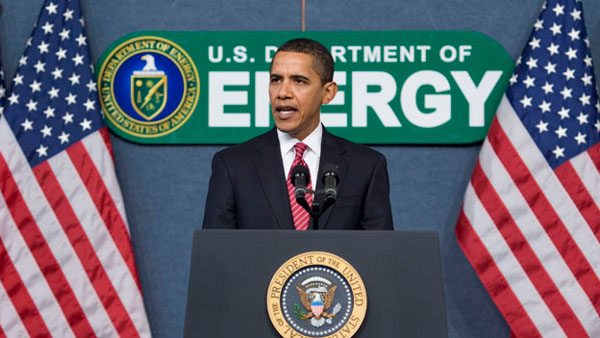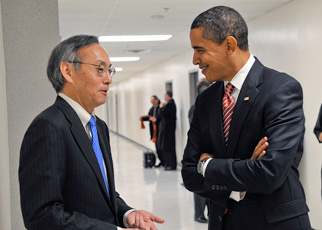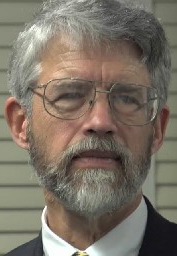Director's Corner
19 March 2009
 Barry Barish |
Science in the Obama era
“We will restore science to its rightful place,” said President Barack Obama in his inauguration address. That statement has raised the hopes of the scientific community, and actions that have followed have further encouraged us to believe that we are entering a new era in the US that will have increased priority for the support of science. On the other hand, the most important problem in the US and worldwide is to deal with the deep economic downturn and the early actions by the new administration are dominantly aimed at dealing with this economic crisis and include a very large stimulus bill. In addition to economic stimulus, early decisions by the Obama administration have included appointing a number of highly regarded scientists to key high-level government positions. It is worthwhile anticipating how all the changes will impact US science, high-energy physics, in particular, and finally on our efforts towards the ILC.
 President Barack Obama speaks at US Department of Energy (February 2009). Photo: Whitehouse.gov President Barack Obama speaks at US Department of Energy (February 2009). Photo: Whitehouse.gov |
The first and most obvious changes are those involving science policies. Policies restricting stem-cell research have been reversed and in full recognition of climate change, the new administration has made energy a major priority by promising to create a clean energy economy, including investing in making homes and federal buildings more energy-efficient, and supporting initiatives towards fuel-efficient cars. In addition to these specific priorities, the president has made it clear in many ways that he will listen to scientists in his administration and that it will embrace science as a foundation for federal policies.
Obama's science appointments have been particularly impressive, beginning with John Holdren as Assistant to the President for Science and Technology and Director of the White House Office of Science and Technology Policy. Holdren earned his PhD in Plasma Physics at Stanford, gave the Nobel Peace Prize acceptance speech for the Pugwash Conferences on Science and World Affairs in 1995, and has been a prominent leader in science policy with emphasis on energy policies in recent years.
The administration has signaled strong support for the physical sciences by announcing plans to double the budget for the National Science Foundation and other federal science agencies over the coming decade, and a leading scientist, Dr. Steven Chu, has been appointed as Secretary of Energy. Chu won the Nobel Prize in Physics in 1997 for cooling and trapping of atoms with laser light. He became Director of Lawrence Berkeley National Laboratory in 2004 and has been a strong advocate of increasing research on alternative energies to combat global warming. This background and orientation fits well with the new administration's priorities, and in addition, we fully expect his continued support for basic research.
 Secretary of Energy Steven Chu meeting with President Barack Obama. Photo: Whitehouse.gov Secretary of Energy Steven Chu meeting with President Barack Obama. Photo: Whitehouse.gov |
The thrust of the 787 billion-dollar economic stimulus package is to create jobs, stabilise the economy and selectively invest in areas that will be crucial for the longer-term economy stability and growth. This bill includes a significant investment in both the health and physical sciences. The DOE Office of Science received 1.6 billion dollars in the economic stimulus package. This may include funds for high-energy physics and, if so, it would help revitalise our high-energy physics programmes at SLAC and Fermilab.
Although there is no direct support for the ILC in the stimulus bill, investments made at SLAC and Fermilab would be indirectly beneficial. Finally, the 2009 Omnibus Bill which was recently passed will end the "continuing resolution" that has restricted our spending so far this fiscal year, and it should restore ILC R&D to full funding. Finally and perhaps most importantly for the long term, we are encouraged by the Obama administration's proposed budgets for 2010 and beyond the support for science. This gives us confidence to plan on stable US R&D funding through the ILC Technical Design Phase.
During the same period and in preparation to propose the ILC as a project, it will be up to us to educate and convince the new administration why they should support US participation in a new ambitious global collaboration to build the next particle accelerator.
It may seem ironic that in difficult economic times, science support in the US was an integral part of the stimulus package recently passed by Congress, and that long-term prospects for science in the future budgets of the new administration look so promising. However, this is not as surprising as it might at first seem. Well before the economic downturn, the case was being strongly made to increase support for the physical sciences. This was epitomised by the well regarded and influential National Academy of Sciences report, "Rising Above the Gathering Storm." More recently we having been making the case that for the wellbeing of the country, it is at least as important to support science in difficult times as in prosperous ones, and from all indications the new administration appears to really "get it."
-- Barry Barish
